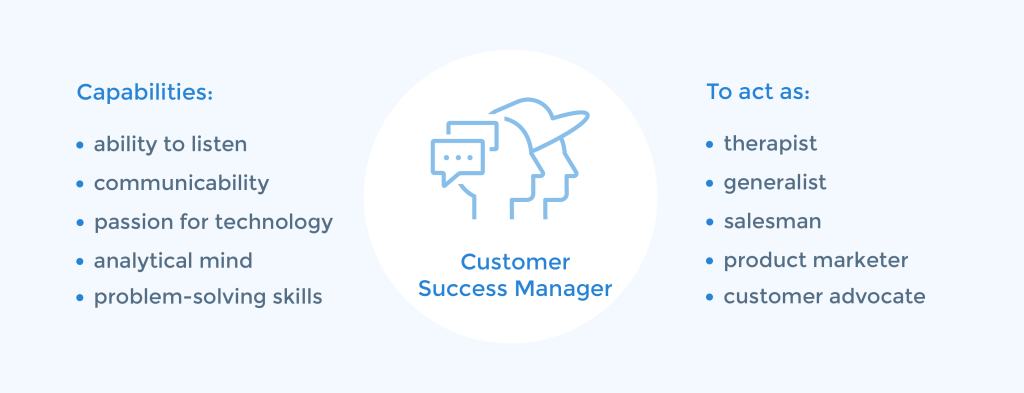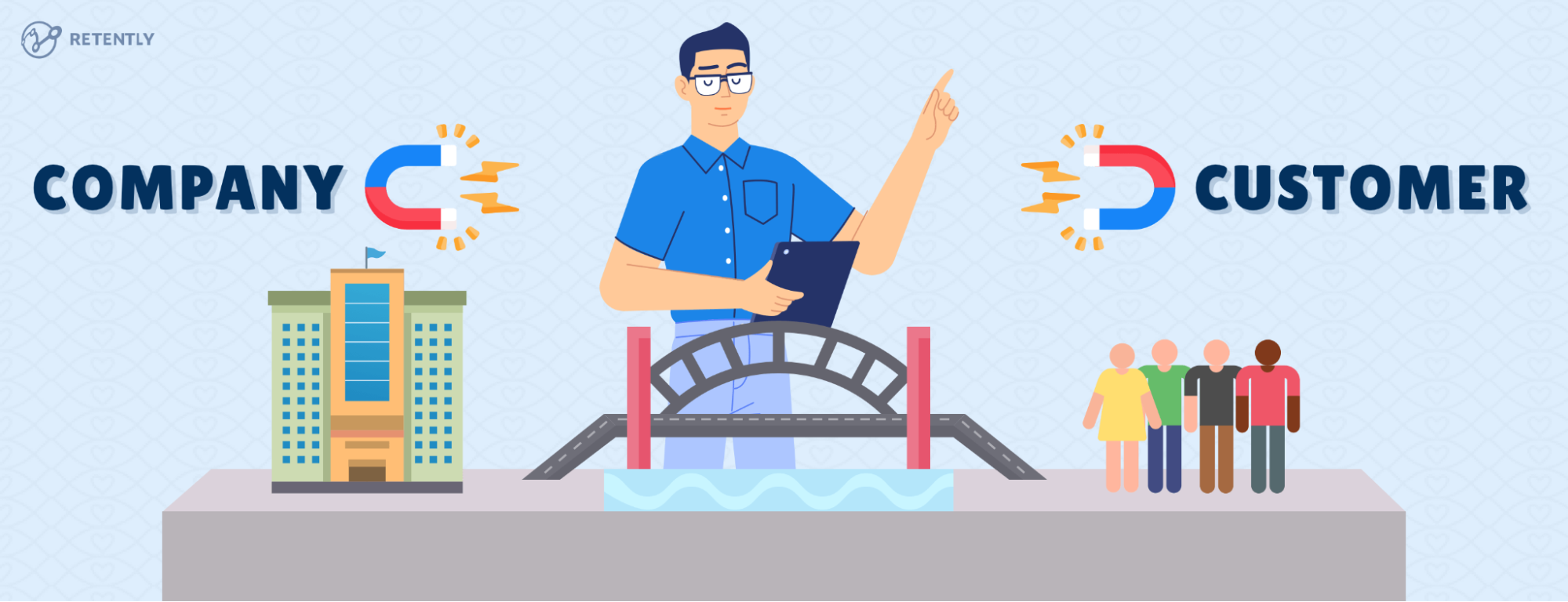As your company begins to take off and gain momentum, it’s very tempting to think about scaling the technical side of the business. That is, you’ll quickly find yourself eager to develop your product and work on new features. Or, you may find yourself in a constant state of break-fix— forever solving problems and focusing on immediate pain points.
Operating from this position means you’ll likely end up prioritizing the hire of additional technical staff (engineers, programmers, etc.) to handle problems as they arise. But once you have all the technical staff you need, where do you turn next?
The Connective Tissue of a Company
The first non-technical hire you make needs to be in Customer Success. Customer Success is the bridge between what your company does and what your customers need you to do. By nurturing the Customer Success department early, you set your company up to grow and adapt to your customers’ needs.
A strong Customer Success team optimizes your company for listening, learning, and empathizing with your customers. This team will be the key to receiving useful customer feedback, discovering product flaws, and understanding the gap between vision and market need. They offer a look into the minds of your customers and can shape the direction of your entire firm.
What to Look for in a Customer Success Manager

Hiring your first Customer Success Manager is not like hiring a PHP expert or WordPress developer. CSMs at an early-stage startup need to be generalists, not specialists. These Renaissance Men and Women need to act as more than just support staff for your new customers, they also have to act as therapists, salespeople, product marketers, customer advocates, and more. In many cases, your CSMs (especially in the early days) will be responsible for onboarding and training new customers, too.
When looking for your company’s first CSM, look for somebody with strong empathic skills and an ability to listen. You’re looking for someone with a wide range of personal skills and talents. After all, it’s an important role and needs to be handled by someone capable of wearing many hats.
Here are some key traits and qualifications to look for:
- Strong Communication Skills: Look for candidates who can clearly articulate ideas, listen actively and empathize with customers. Excellent written and verbal communication skills are a must.
- Analytical Mindset: A good CSM should be comfortable working with data, able to analyze trends, and use insights to inform strategies and decisions.
- Technical Proficiency: Familiarity with CRM tools and other relevant software is essential. Candidates should be able to quickly learn and adapt to new technologies.
- Problem-Solving Ability: CSMs should be adept at identifying issues and finding practical solutions quickly and efficiently.
- Customer-Centric Attitude: The best candidates genuinely care about customer success and are dedicated to helping customers achieve their goals.
- Adaptability: Given the dynamic nature of the role, the ability to adapt to changing circumstances and manage diverse customer needs is key.
What They’re There For
Feedback is a vital ingredient in your product’s lifecycle. Without it, you’re working blind, hoping the features you add are in line with a customer’s needs. To ensure your engineering resources are solving problems that actually matter, your CSMs must be dedicated to scaling the feedback loop.
This could mean deploying automated email campaigns (such as customer retention emails), rapidly sharing feedback with the right teams, or building best practices around soliciting feedback from customers.
But when it’s all said and done, your CSMs are really there to learn how and why customers interact with your product. Ensure they’re both nurturing relationships with customers and sharing the results with your product development teams.
Key Responsibilities
Let’s go through the main responsibilities for a clearer picture:
1. Onboarding New Clients
This means guiding customers through the initial setup and ensuring they understand how to use the product or service effectively. A smooth onboarding process sets the tone for a positive customer experience. The CSM provides training, resources, and support to help new clients get up and running quickly and efficiently.
2. Monitoring Customer Satisfaction
Once customers are onboarded, a CSM continuously monitors their satisfaction levels. This involves regularly checking in with customers to gather feedback, conducting surveys, understanding their needs and challenges, and making sure they’re getting the expected value. This proactive approach allows CSMs to address concerns before they turn into liabilities, ensuring customers remain happy and engaged with the product. It also helps build strong, trusting relationships, which are essential for long-term loyalty.
3. Providing Ongoing Support and Resources
Customer needs and expectations can evolve over time, and a CSM is always there to provide ongoing support and resources. Whether it’s answering questions, offering new training sessions, or sharing best practices, CSMs are dedicated to helping customers succeed. By being a reliable point of contact, CSMs ensure that customers always have the help they need.
4. Identifying Upselling and Cross-Selling Opportunities
By understanding the customer’s business goals and current usage, CSMs can recommend higher-tier products or additional services that add value. This not only boosts revenue but also ensures customers are fully leveraging the product to meet their needs.
5. Securing Renewals
Ensuring customers renew their contracts is a critical aspect of a CSM’s role. Through ongoing engagement and by highlighting the value of the product, CSMs work to secure renewals and foster long-term retention. They address any issues that might hinder renewals and continuously demonstrate the product’s benefits to the customer.
6. Acting as a Liaison Between Customers and the Company
CSMs act as the voice of the customer within the company. They communicate customer feedback, concerns, and suggestions to relevant departments, such as product development, marketing, and sales. This helps the company understand what customers need and want, leading to better products, improved services, and, ultimately, happier customers.
Equipping Your New Team Members
With your new CSMs on board, it’s important they have the tools to bring their strategies to life. They may opt to use in-app messages to walk customers through your product, send lifecycle emails through apps like Mailchimp, or share product feedback with the team through Slack. Either way, ensure your team is well-equipped and able to act on their ideas.
Without the necessary tools, training, and support, they may struggle to deliver the expected results. Here are more aspects to look into:
- Comprehensive Onboarding: Provide a thorough onboarding process that includes an introduction to your company’s products or services and customer success philosophy.
- Adequate Tools: Ensure CSMs have access to the right tools, such as CRM software, analytics platforms, and communication tools, to manage customer relationships effectively. What’s more, according to Totango’s Customer Success Industry & Salary Report, 4,34% of CSMs identify lack of tools as a challenge for their work.
- Ongoing Training: Invest in continuous training and development for CSMs. This includes product training, customer service skills, and industry-specific knowledge.
- Supportive Environment: Foster a supportive work environment where CSMs can easily collaborate with other departments. It includes having open lines of communication and a culture that values teamwork. This ensures everyone is on the same page and working towards common objectives.
- Dedicated Resources: Allocate dedicated resources, such as a budget for customer success initiatives and access to specialized support teams (read more on the difference between customer support and customer success in our dedicated guide), to help CSMs address customer needs effectively.
- Performance Feedback: This includes regular check-ins, providing feedback, and helping to remove any roadblocks that may hinder their performance.
The Business Impact of a Customer Success Manager
Customer Success isn’t just about making people smile, but a strategic investment that drives real business results. Here’s how:
- Retention: Happy customers stick around. A Customer Success Manager ensures that users aren’t just satisfied, but that they’re getting continuous value from their purchase, dramatically reducing the likelihood they’ll jump ship for a competitor.
- Satisfaction: When customers feel understood and supported in their journey, their satisfaction levels shoot up. This satisfaction isn’t just a feel-good metric – it translates directly into positive product reviews, word-of-mouth recommendations, and a stronger brand reputation.
- Customer Lifetime Value (CLV): This is where the long-term impact of customer success becomes crystal clear. By increasing retention and satisfaction, CSMs boost the total value each customer brings to your business over their entire relationship with you. Essentially, a happy, loyal customer is likely to buy more and promote more over a longer period, significantly impacting your bottom line.
In a fast-paced, high-expectation digital environment, customer success isn’t just about keeping up – it’s about staying ahead. It’s about ensuring that customers reach and surpass their goals thanks to your product or service. This proactive approach doesn’t just solve problems; it creates lasting partnerships and drives sustainable growth.
Measuring Success: Track the Effectiveness of CSMs
Yet, without clear metrics, it can be difficult to measure the success of a CSM and justify the investment in this role. Businesses need specific KPIs to evaluate the impact of their CSMs.
To do that:
- Define Clear KPIs: Establish clear, measurable KPIs that align with the company’s goals. Common KPIs for CSMs include customer retention rates, Net Promoter Scores (NPS), Customer Lifetime Value and churn rates. Clear performance goals will help CSMs continuously improve and grow in their role.
- Customer Feedback: Regularly gather customer feedback through surveys and direct interactions. Use the insights to assess the effectiveness of CSMs in improving customer satisfaction and loyalty.
- Performance Dashboards: Implement performance dashboards that allow CSMs and management to track progress against established KPIs in real-time. This transparency helps in making data-driven decisions.
- Regular Reviews: Conduct regular performance reviews with CSMs to assess their achievements and identify areas for improvement. Use these reviews to set new goals and adjust strategies as needed.
Wrap-Up: Benefits of Hiring Customer Success Managers
Bringing CSMs on board can make a huge difference in how customers perceive and engage with a company. Here’s why:
- Enhanced Customer Retention: CSMs play a crucial role in reducing churn rates by building strong relationships and ensuring customers continuously receive value from your products or services.
- Increased Customer Loyalty and Advocacy: By turning satisfied customers into loyal advocates, CSMs help drive positive word-of-mouth and attract new business.
- Proactive Problem Solving: CSMs anticipate and address customer issues before they escalate, maintaining high levels of customer satisfaction and trust.
- Revenue Growth: Through upselling and cross-selling, CSMs contribute significantly to the company’s revenue growth.
- Improved CLV: By fostering long-term relationships, CSMs enhance the overall value each customer brings to the business.
- Data-Driven Insights: Leveraging customer feedback and data, CSMs inform product improvements and innovation, ensuring your offerings remain competitive and relevant.
Creating a Culture of Customer Success
At the end of the day, your company’s success will come down to customer acquisition and retention. As soon as your firm has all the technical staff they need, your very first non-technical hire should be in Customer Success. This is the only role that provides a meaningful link between your engineers and the customer. It’s also the best way to discover insights behind customer behavior and influence the direction of your company.
Over time, the insights gleaned from this department will spill over into the rest of the company— helping your entire team provide an outstanding customer experience.
Is your business ready to take its customer relationship management to the next level? Consider the strategic addition of a Customer Success Manager to your team. Take the time to evaluate your current customer service strategies using Retently and imagine the potential benefits of incorporating a dedicated professional focused solely on customer success.
Get started with a free trial, implement regular surveys as part of your evaluation process to help you stay attuned to your customers and maintain a competitive edge.






























 Alex Bitca
Alex Bitca 


 Greg Raileanu
Greg Raileanu 
 Christina Sol
Christina Sol 
